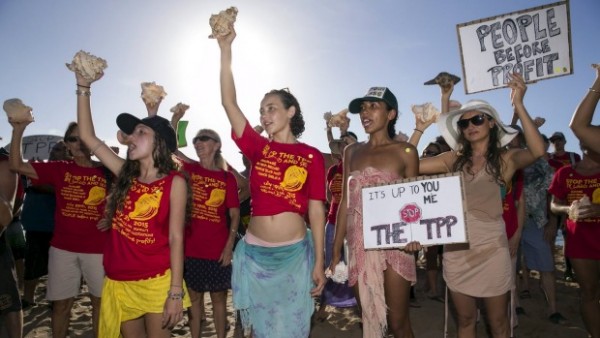
Protestors gather on the beach near the hotel where the Trans-Pacific Partnership meeting is being held in Hawaii.
Negotiations on a landmark free-trade pact among 12 Pacific nations stumbled as pressure mounted on Canada to soften its stance on limiting dairy imports.
After months of demands from nations including the United States, Australia and New Zealand to open its dairy markets as part of the Trans-Pacific Partnership, Canada outlined a proposal during talks in Hawaii that other nations rejected as inadequate, according to two people briefed on the negotiations.
Frustration over the Canadian position has darkened negotiators’ mood on the sun-drenched island of Maui, where talks are scheduled to run through Friday. U.S. Trade Representative Michael Froman, the host of the meeting, has called on nations to tackle the “tough political issues” standing in the way of an agreement.
“The good thing is that Canada is talking now,” Mike Petersen, New Zealand’s special trade envoy for agriculture, said Wednesday in an interview. “But we haven’t seen enough, and this is not something we can sell at home.”
Optimism had been high going into the talks after six years of negotiations on a pact that would stretch beyond a normal trade deal to take in such issues as intellectual property and state-owned enterprises. An agreement would clear barriers to commerce among nations that produce 40 percent of global economic output and is a centerpiece of the U.S. administration’s strategic refocus on Asia.
Canadian Prime Minister Stephen Harper, who has pledged to reach a deal, signaled from Ottawa that the team led by Trade Minister Ed Fast has the flexibility to reach an accord.
“Given that we are a trading nation, and given the global economy is the way of the future, we cannot be left out of this kind of trade arrangement,” Harper said in an interview on Wednesday. “The government is at the table making sure it protects the interest, as best we can, of every Canadian industry.”
Still, Canada’s offer on Maui fell short of what its trade partners expected, according to the people briefed on the talks. The absence of extensive staff-level work with Canada before the Hawaii meeting kicked off also handicapped the talks, the people said, asking not to be named given the sensitivity of the negotiations.
A Canadian government official dismissed the idea that the country is holding up talks or that it dragged its heels, saying Fast and his chief negotiator have spoken regularly with their counterparts in recent months.
“We’ve been a serious and constructive negotiating partner,” Rick Roth, a spokesman for Fast, said in an email. “I view this type of pressure tactic as just more negotiating through the media, and we’ve been consistent in not engaging in that.”
Trevor Kincaid, a spokesman for Froman, declined to comment.
The Hawaii talks come on the eve of an election campaign in Canada, as polls signal Harper’s Conservatives are at risk of losing. The Canadian Broadcasting Corp. reported Wednesday that Harper on Aug. 2 or Aug. 3 will call an election campaign. Conservatives regularly tout their record in signing new trade pacts and have said being included in TPP is essential.
Harper will be under pressure to end protection of farmers in order to be included in the TPP, but faces domestic pressure from the dairy industry — concentrated in Ontario and Quebec, the two most vote-rich provinces — to preserve the lucrative system of quotas and tariffs and keep Canada’s borders at least partially closed to milk, cheese and other protected industries.
A better Canadian offer could resolve the interlocking disagreements common at the end phase of trade talks, Petersen of New Zealand said. Without that, the U.S. won’t give New Zealand better access to its market, and in turn wouldn’t have the credibility to demand Japan allow more dairy imports.
“If Canada doesn’t open to the U.S., none of those dominoes will fall,” Petersen said.
The issue looms particularly large for New Zealand, which sells more than 90 percent of its dairy production abroad, accounting for 27 percent of its total exports, Petersen said.
Wally Smith, president of Dairy Farmers of Canada, said he had “no reason to believe” his country couldn’t reach an agreement in Hawaii.
The Canadian system limits imports and domestic production to raise prices its dairy farmers receive. Smith suggested Canada has flexibility to increase imports as long as the change can be forecast.
“Predictable imports will allow us to manage the system on behalf of all Canadians,” he said in an interview.
Canada has previously concluded trade pacts with other nations that affected its supply management system. In a deal with the European Union in 2013, Canadian negotiators held back concessions until the last few days of talks, then cushioned the blow with promises to compensate farmers.
Source: Chicago Tribune









